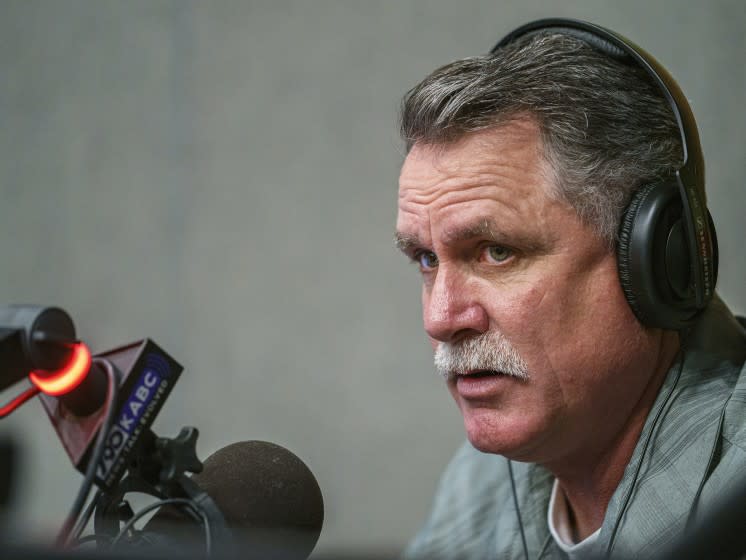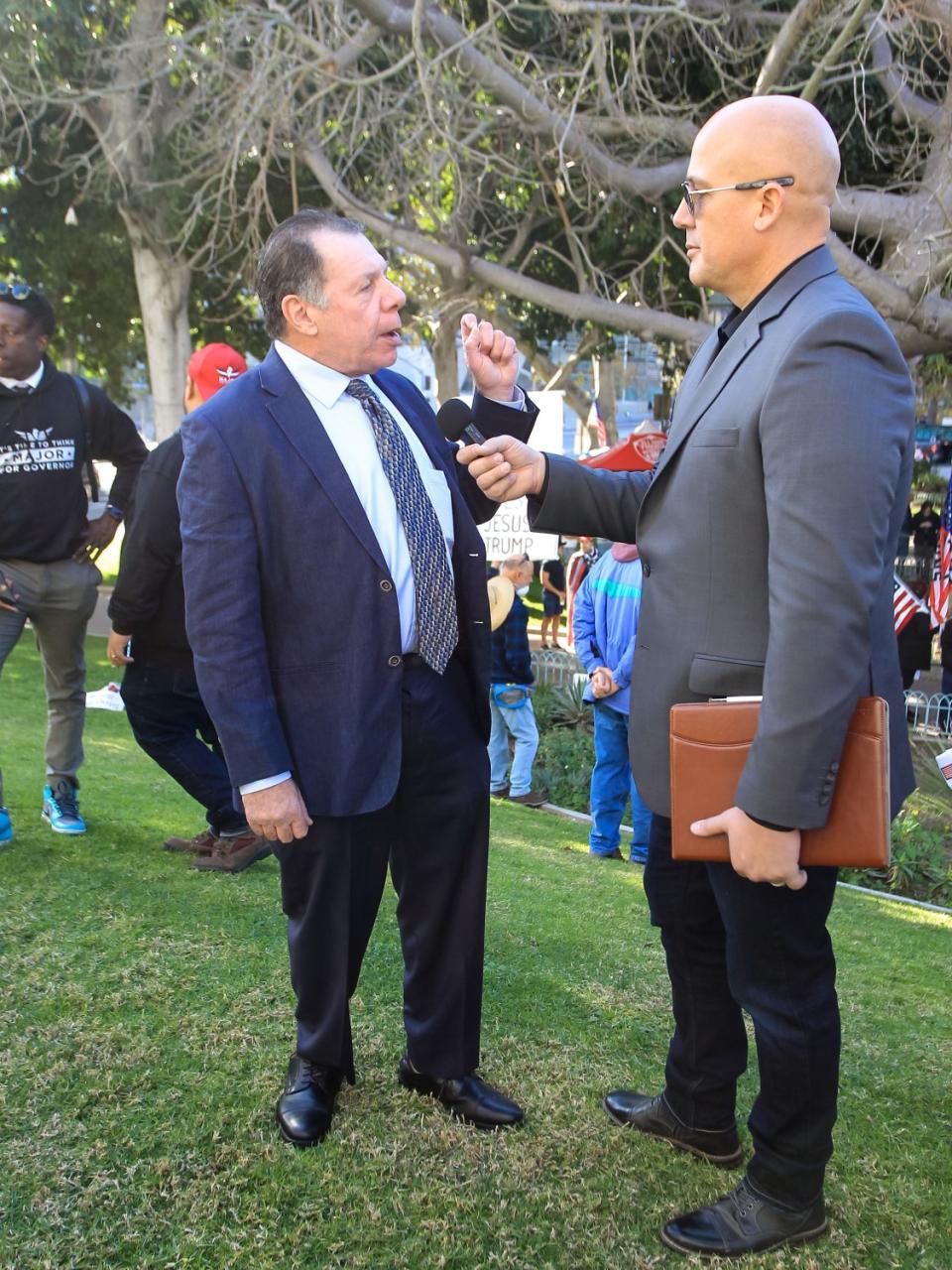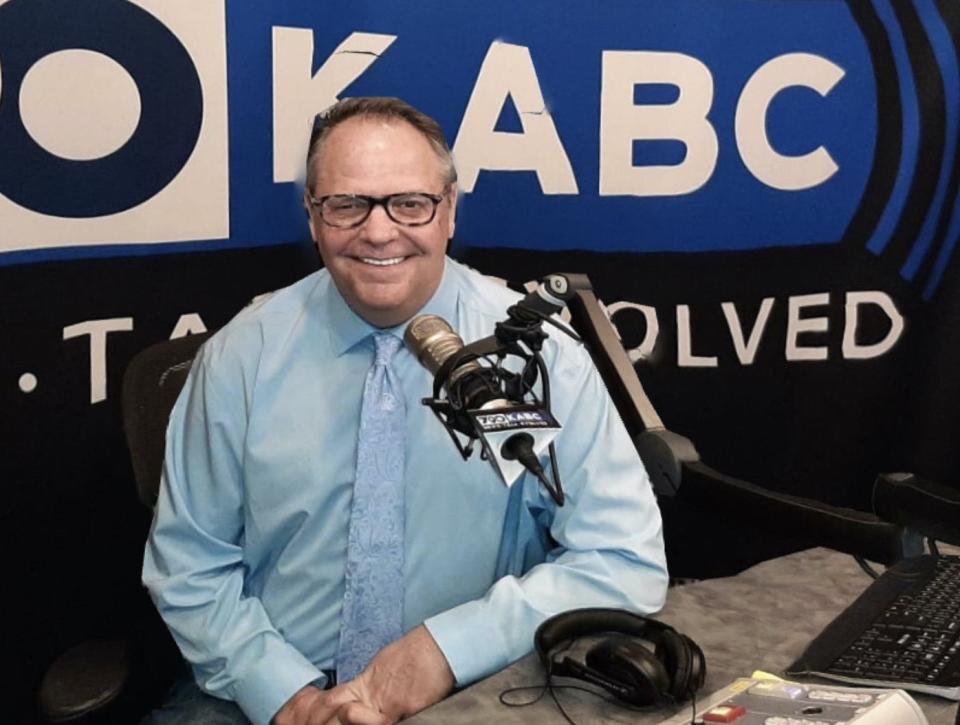How three political novices with turbulent pasts helped spark the Newsom recall

It’s “Friday Night at the French Laundry,” the weekly radio broadcast run by leaders of the campaign to recall Gov. Gavin Newsom, and Bianca is calling to offer herself as living proof that the campaign isn’t all about white guys from the state’s deep-red hinterlands. She tells the KABC-AM call-in audience that she’s a San Franciscan and a “Berniecrat,” proudly adding, “This is a bipartisan thing.”
But Bianca’s message of a diverse anti-Newsom alliance is soon overtaken by a grab bag of other complaints. She wallops the media for giving short shrift to the Mars rover landing and declares that hate crime laws must be stopped because they are “the cornerstone of fascism.” She’s followed by Glenn from Simi Valley, who invokes a QAnon-style theory about COVID-19 vaccines being a pretext for “surveillance, control and monitoring … of citizens throughout the world,” a claim that goes unrebutted by the radio hosts.
The “French Laundry” show reflects the full spectrum of viewpoints powering the once-underestimated coalition to oust Newsom from office. Some listeners call in to label Newsom a “Nazi” or “one of the golden boys of the new world order,” while others air real-world grievances. They talk about closed schools, businesses suffering from COVID-19 restrictions and the failure of Newsom and other California Democrats to make a dent in the state’s growing homeless population.
The show reveals the movement’s challenges ahead — maintaining the fervor of the anti-Newsom movement, while keeping in check some of its more extreme elements, which might turn off mainstream voters. But for now, the campaign is claiming a milestone, with the secretary of state releasing reports Monday confirming organizers had submitted enough signatures to put the question before voters.
It also was a personal victory for three unlikely political brothers, who share not just KABC microphones but turbulent pasts, a profound inexperience in statewide politics and a conviction that they can be the Davids who take out the state’s political Goliath.
Sometime Realtor Mike Netter emcees the two-hour shows and takes the title of “maitre d’” in a whimsical embrace of the “French Laundry” motif — named after Newsom’s ill-advised, maskless foray to a Michelin three-star restaurant last year. He’s joined by retired Yolo County sheriff’s sergeant (here “head chef”) Orrin Heatlie, 52, and onetime newspaper reporter (now “cashier”) Randy Economy, 61.
“The three musketeers,” as fans call them, deliver a raw, seat-of-the-pants reimagining of a media format that has been a mobilizing juggernaut for conservatives for at least three decades. They claim the everyman mantle, aligned against not only the state’s Democratic leaders but also some in the Republican establishment whom they see as opportunistic latecomers to their cause.
“We’ve been told from the start we are a ragtag bunch of hicks,” said Netter, 64, “We marvel at what’s happened. But at the same time, we don’t. We always thought that we had a really good chance of making a change in the state, because we weren’t following the usual patterns.”
Netter and his radio partners are feeling even more vindicated, even cocky, since their recall campaign crossed the signature threshold this week, putting Newsom in front of voters later in 2021, a year before his first term is set to expire. Economy said he burst into tears on hearing that the recall qualified for the ballot, catapulting him into more than 80 media interviews — ranging from the U.S. television networks to Russia Today — in three heady days that followed.

“I think the governor needs to have a in-depth conversation with us about the recall,” Economy said. “He has an open invitation to come on ‘Friday Night at the French Laundry.’ But I don’t think he has the courage to be able to do that.”
Over the last several months, the movement to unseat the governor has gained momentum through a mixture of grass-roots organizing — led largely by the three musketeers — and traditional campaigning and fundraising, engineered by the GOP’s national and statewide party apparatuses.
It’s a far different alliance from that of 18 years ago, when conservative talk radio galvanized the opposition that made Gray Davis the first California governor to be recalled in the state’s history.
The subsequent rise of the internet and diminishment of legacy media suggest the AM airwaves will play less of a role in the anti-Newsom campaign. But the trio effectively has tripled down on the value of reaching voters through their earbuds. Along with the Friday night show, they also host a regular Wednesday “Recall Town Hall” that streams on Facebook and other platforms and deliver “The Randy Economy Show — Recall Radio” on Saturday mornings on KABC.
The three hosts say the shows win friends and influence voters, on the cheap. But a nonpartisan audience ratings service and media veterans suggest the impact of the “French Laundry” show is incremental, at best.
“Until you told me about their show, I had never heard of them,” said Jon Fleischman, operator of the Flash Report, an influential website for California conservatives. “And if I had not heard of them, how big a reach can they have? On Friday nights just how many people are going to be listening in, anyway?”
There are no independent measures of the size of the audience for the show, which runs from 7 p.m. to 9 p.m. Fridays. But KABC (790 AM) ranks as only the No. 33 station in the Los Angeles market for audience reach during weekday evening “drive time,” according to the Nielsen Audio rating service. That 3 p.m.-to-7 p.m. slot, just before “French Laundry,” brings the station 98,200 unique listeners cumulatively, over the course of five days, Nielsen estimates.
Another indication that the show hasn’t exactly caught fire: It hasn’t solicited enough donations to consistently recoup its $2,500 “brokered” air-time fee that the recall campaign pays for the air time, the hosts acknowledge.
The “musketeers” shrug off the critiques. They say they have heard plenty of carping from the media and political elite before, including those who predicted their petition drive would fail. And they assert that the streaming audience for the show, on KABC.com, reaches a bigger audience than anyone knows.
“Our phone lines are lit up from the time we get in until the time we leave the studio,” said Heatlie, the lead signatory of the recall petitions. “All up and down the state and even across the country, people are engaged.”
Heatlie and Netter became acquainted during a failed 2019 attempt to recall Newsom. They wanted to try again. So the duo drove south on the Saturday after Thanksgiving to meet with Economy at his Rancho Mirage home.
They agreed on the spot to make Economy, a “converted Democrat,” one of two paid campaign employees, at $5,000 a month.
“We’ll get to see if three regular guys can change California,” Economy said, with a tone of amazement.
And no wonder. Heatlie had no prior formal political experience. Netter volunteered nearly half a century ago for a congressional candidate, though he can’t recall which one. Economy cites Grace Napolitano’s successful run in the 1980s for the Norwalk City Council as his greatest triumph as a campaign manager. The veteran Democrat now serves in Congress.
The spark that lighted Heatlie’s recall fire came in 2019, when he watched a video of Newsom telling immigrants that they had the right to bar authorities who did not have a warrant from entering their homes. So he got busy, initially by stepping up his social media activism.
Declared one Facebook post by Heatlie: “Microchip all illegal aliens. It works! Just ask Animal control!”
Heatlie now dismisses the comment as a moment of “hyperbole,” meant to stir debate, not to be taken literally. But Newsom’s defenders for months have cited it as evidence of the recall campaign’s extremist roots.
Last fall, Facebook removed Heatlie, which under the social media giant’s rules amounts to a lifetime ban. A spokeswoman described the action as unrelated to the recall. While declining to provide specifics, the Facebook official noted that the platform’s policy removes “pages and groups for a variety of reasons, including hate speech [and] incitement to violence,” also banning group administrators whose pages pose “a risk to public safety.”
Netter had a long career as a purchasing executive in the office supply business before shifting into real estate.
His first concerted political action since his teens grew out of irritation with then-Sen. Kamala Harris (D-Calif.), whom he saw as driven by personal ambition more than a spirit of public service. When Netter learned that U.S. senators cannot be recalled, he turned his attention to Newsom, while also reposting false claims that the 2020 election was stolen from President Trump.
Netter emerged on the recall stage after a string of personal challenges. He lost his home in the 2007 San Diego County wildfires, then took a huge tax hit when the government taxed his insurance settlement, he said in an interview. Public records show the Internal Revenue Service filed a $125,000 lien in 2017 against Netter for unpaid taxes. California filed a separate action to recover $32,000 in back state taxes.
“Yeah, I’m behind on my taxes,” Netter said in an interview, adding that he’s making installment payments on the debts.
He urged the media to instead focus on “Gavin Newsom and his cavalier attitude, about being out of touch with the people of California, which has only been amplified by COVID.”
Economy’s journey to the “French Laundry” microphone may have been the bumpiest of all.

For some 30 years he had been living with HIV, his eyesight failing as a result of a related cancer, he said. Now blind in one eye, Economy relies on others to get around. He also regularly wears an eye patch, giving birth to his persona as the radio show’s “political pirate.”
When asked about a 2007 methamphetamine conviction, Economy acknowledged that he once struggled with addiction. He said his arrest and later probation marked a bottoming out. He said he has been sober since then, a resurrection he attributes in large part to his conversion to the Catholic Church.
“I don’t begrudge my past,” Economy said. “I love my past. I learned from my past.”
The recall spokesman said he would prefer the focus to remain on Newsom, a view vehemently seconded by his co-hosts.
“This is about the governor of California,” said Heatlie, “and what he’s done to put this state in such disarray, with the highest homeless rate, the highest taxes and the lowest quality of life we’ve ever experienced in California.”
Patched into the show in April, restaurant owner Angela Marsden voiced the anger of many in the business community. She blamed Newsom’s COVID restrictions for battering her Sherman Oaks bar and grill. “There’s no opportunity for the middle class,” she told “French Laundry” listeners. “They are going to make us extinct in California.”
Caller Tim agreed, saying he had arrived in California nine years ago from the Midwest. “It was like a Utopia then,” he said. “And now people are leaving in droves.”
Economy said he and his fellow hosts embrace such mainstream complaints and “just kind of roll our eyes” at conspiracy theories, like Glenn’s, about COVID-19 vaccines as a gateway to human enslavement. Then why not rebut the outlandish claims?
Economy laughed. “I might have been taking a leak during that call,” he said.
Davis’ 2003 recall offers a cautionary tale for those who underestimate the power of a popular revolt, and the role radio can play in it. “John and Ken,” popular daytime hosts at KFI (AM-640) in Los Angeles, were widely viewed as formidable leaders of the anti-Davis forces. Their show remains one of the most popular in Southern California, ready to be mobilized against the governor they depict as a self-involved lightweight.
Political polarization has become only more pronounced since the last California recall, said Michael Harrison, publisher of “Talkers,” a publication that covers the talk radio industry.
“I call it the ‘daily dance of affirmation,’” he said, attributing the phenomenon to liberals and conservatives. “Over the years it has become more about telling your audience what they want to hear, rather than what they need to hear.”
The “French Laundry” partners appear to be thrilled to be part of the dance. Economy gushed about being on the phone for 10 hours straight with journalists after approval of the recall petitions.
“We’re just regular people with regular problems, who have overcome amazing obstacles in life to get where we are,” Economy said. “I don’t know what our world and our personal lives and our collective campaign is going to be like in six weeks, or six months. But just stay tuned to see what happens.”
This story originally appeared in Los Angeles Times.

